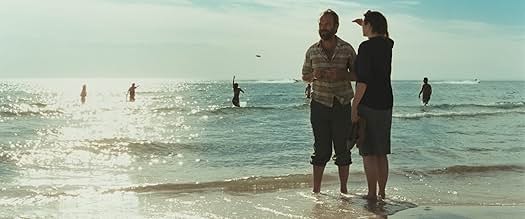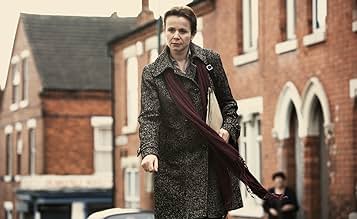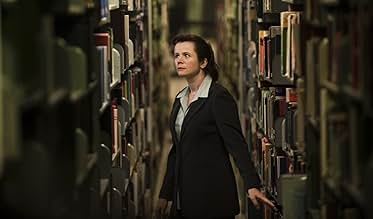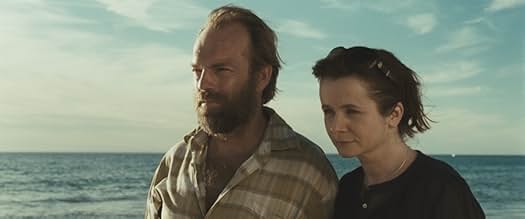CALIFICACIÓN DE IMDb
7.1/10
6.1 k
TU CALIFICACIÓN
Agrega una trama en tu idiomaSet in 1980s Nottingham, social worker Margaret Humphreys holds the British government accountable for child migration schemes and reunites the children involved -- now adults living mostly ... Leer todoSet in 1980s Nottingham, social worker Margaret Humphreys holds the British government accountable for child migration schemes and reunites the children involved -- now adults living mostly in Australia -- with their parents in Britain.Set in 1980s Nottingham, social worker Margaret Humphreys holds the British government accountable for child migration schemes and reunites the children involved -- now adults living mostly in Australia -- with their parents in Britain.
- Dirección
- Guionistas
- Elenco
- Premios
- 10 premios ganados y 21 nominaciones en total
Heath Tammy
- Susan
- (as Tammy Wakefield)
Alastair G. Cumming
- Australia House Official
- (as Alistair Cummings)
- Dirección
- Guionistas
- Todo el elenco y el equipo
- Producción, taquilla y más en IMDbPro
Opiniones destacadas
Oranges and Sunshine – CATCH IT (B+) The film tells the story of Margaret Humphreys, a social worker from Nottingham who uncovered the scandal of "home children", a scheme of forcibly relocating poor children from the UK to Australia and Canada. Margaret reunites estranged families and brings worldwide attention to the cause. Deported children were promised oranges and sunshine but they got hard labor and life of misery and sexual abuse in institutions such as Keaney College in Bindoon, Western Australia. (Wiki) Oranges and Sunshine is a sensitive subject matter which defiantly put Britain in Shame when Margaret Humphreys broke out the story in 80s. Emily Watson's portrayal of Margaret Humphreys' trouble to help the transported kids all the way to Australia is heart wrenching. The emotional turmoil she goes to work for them while managing her family is something really inspiring. Emily Watson is a great actress and no doubt she brings her emotional range to the real life role model. In supporting cast Hugo Weaving & David Wenhem did a fine job. Overall, it's a sensitive movie about a sensitive issue. Keep in mind its tear jerker, so keep a box of tissue.
I saw this truly extraordinary film last night ... and know now that it will be with me for a long time to come. The story is totally compelling and the acting is superb! Emily Watson is always a wonder to watch and she does some of her finest work here -- perhaps her best performance ever. The supporting players are, without exception, highly gifted and each finds his or her character to the point where you feel, at times, that you are watching a documentary, so fine are their portrayals. Based on the true experiences of social worker Margaret Humphreys (that will leave you with your mouth agape often)and with a beautifully written script that moves briskly ... and, at many turns, into frightening territory, with terrific direction, this is a must-see! Put it on your list! If there is any justice, this one will figure when the awards are handed out!
I can only give this a 10/10 due to the fact that i grew up with many of the fairbrigians and the Bindoon and Clontarf boys. I am a 62 year old and still socialise with some of these people. Fairbridge in Western Australia is situated just south of Perth and very close to Pinjarra. Every year they hold a Fairbridge festival that lasts for a whole weekend and hosts lots of activities including top groups and singers. I myself was once committed to a boys institution and met many of these kids that had ran away from Bindoon and other institutions that were abusive to them. Kingsley Fairbridge was not the abusive type and most Fairbrigians do not tell the same story as the Christian brothers torture. This movie portrays the story of Margaret Humphrey and her quest to find these -(now grown ups) to find their real parents. Only a very small portion found relatives. The goof here says that Margaret couldn't have moved to a stone house in Perth. Fremantle was the first landing and the first settlers along with convicts dug out a huge section of one of the hills which was limestone. Limestone was used for the building of almost -ALL the first buildings including the Fremantle prison. Many more houses and buildings in both Fremantle and Perth still stand today. I loved the movie and i believe it is very much close to the truth. A must to see.
It is always a jolt when a bit of buried history surfaces and makes us realize that the world is not all that sane as we would like to believe: the Chaos Factor raises its ugly head as in this screen adaptation by Rona Munro of Margaret Humphreys' true story book 'Empty Cradles'. This is a very powerful film, all the more so because of the quality of acting and direction by Jim Loach who never lets the film run out of control despite the unveiling tragedy.
The story is set in the 1980s where Nottingham, social worker Margaret Humphreys (Emily Watson) is a social worker who encounters a middle aged woman who has traveled form Australia to find her birth parents. Margaret at first doesn't want to increase her workload with a wild tale of children having been deported form England by ship to be placed in orphanage work camps in Australia, but with the aid of her supportive husband Merv (Richard Dillane) she begins to investigate the uncovered secret, ultimately traveling to Australia where she meets the 'unwanted children' as adults each longing to return to the UK to meet their families. The children when deported were as young as four to thirteen years old and had been told their parents either were dead or didn't want them and the representatives from the government promised them a safe home with 'oranges and sunshine' in Australia. There are several 'victims' as played by Hugo Weaving, David Wenham, Russell Dykstra and others who help personalize the unspoken crime until Margaret progresses to the point where she can hold the British government accountable for child migration schemes and reunite the children involved -- now adults living mostly in Australia -- with their parents in Britain. Though the deportations occurred from the 1940's through the 1970's it was only after Margaret Humphrey's 1994 book and then much later after when February 2010 Great Britain's Prime Minister Gordon Brown finally issued a full apology to those deported children and their families.
The supporting cast is uniformly excellent but it is the glowing performance by Emily Watson that makes this revelation of a film remain in the mind long after the credits explain how the solution played out in reality. This is a tough film but an important one and deserves a much larger audience than it has found.
Grady Harp
The story is set in the 1980s where Nottingham, social worker Margaret Humphreys (Emily Watson) is a social worker who encounters a middle aged woman who has traveled form Australia to find her birth parents. Margaret at first doesn't want to increase her workload with a wild tale of children having been deported form England by ship to be placed in orphanage work camps in Australia, but with the aid of her supportive husband Merv (Richard Dillane) she begins to investigate the uncovered secret, ultimately traveling to Australia where she meets the 'unwanted children' as adults each longing to return to the UK to meet their families. The children when deported were as young as four to thirteen years old and had been told their parents either were dead or didn't want them and the representatives from the government promised them a safe home with 'oranges and sunshine' in Australia. There are several 'victims' as played by Hugo Weaving, David Wenham, Russell Dykstra and others who help personalize the unspoken crime until Margaret progresses to the point where she can hold the British government accountable for child migration schemes and reunite the children involved -- now adults living mostly in Australia -- with their parents in Britain. Though the deportations occurred from the 1940's through the 1970's it was only after Margaret Humphrey's 1994 book and then much later after when February 2010 Great Britain's Prime Minister Gordon Brown finally issued a full apology to those deported children and their families.
The supporting cast is uniformly excellent but it is the glowing performance by Emily Watson that makes this revelation of a film remain in the mind long after the credits explain how the solution played out in reality. This is a tough film but an important one and deserves a much larger audience than it has found.
Grady Harp
Sarah's Key was critically lauded for its reliable method of evoking raw anguish in its audience by depicting the trauma of a savage injustice from a child's perspective. In the same year, Jim Loach's feature drama handles the similar material of an scandal that's just about on par with the Vel d'Hiv roundup, but the film's subjects are all well into adulthood by the time we are meeting them. The fact that the victims are always shown as adults (in physical form at least) has given the achievement of pulling off this excellent film a higher degree of difficulty, seeing as the actors and screenplay writers are required to work extra hard to win the audience's sympathy, rather than having the simple forgivable innocence of an actual child on screen doing the job. However, this is not to say that Sarah's Key was mere emotional pornography: it found excellent ways of challenging itself in other aspects which gave it a greater level of sophistication, but in terms of expressing the heartbreak, the feat of Oranges and Sunshine is much more remarkable.
Among the topics being explored here is the very complicated issue of adoption. The burdensome puzzle of how a child in an unstable family situation or an unhealthy state of living should receive professional help – whether such interference is truly protecting their best interests or inflicting deep psychological harm by depriving them of family – has long been troubling child protection authorities. In mid- twentieth-century England, the popular solution settled on was the organised deportation of these children to Australia. Told that they were orphans, with no living relatives to care for them, they would be sent over in large numbers and, once there, sold into slavery for a respected church organisation commonly refferrred to as "The Brothers".
Several decades later, a determined social worker from Nottingham has begun to single-handedly reunite the victims of the outrage with their family back in England. As they relate to her their heartwrenching stories, each with their own despicable atrocities on top of what has already been mentioned, the irreparable damage of being raised without a proper family becomes apparent, and they are reduced to miserable, vulnerable, homesick little children. Its frequent mentioning of mothers, its claim that the wound of lost parents will never truly heal, and the fact that most of the victims shown are boys creates very distinct allusions to Peter Pan, even before that similarity is actually mentioned by one of the people. An additional noticeable parallel between this film and another classic story is the idea of a child suffering lonesomely at the hands of a cruel organisation under the sneaky pretense that they are an orphan, which is reminiscent of Oliver Twist.
However, it would be grossly unfair to just cynically dissect this film using only comparisons: it displays a very impressive divergence from the typical conspiracy drama. Its most prominent asset is the fully- fledged characterisation of its activist hero and the equal attention spent on showing her suffering as well that of her clients. The delightful Emily Watson obviously does a great deal to bring her to life, playing her so brilliantly that she comes across as both perfectly likable and humanly multi-faceted. Hearing such painful stories is incredibly taxing, and the growing unpopularity she is gaining as she stirs the government and the press results in some truly terrifying personal attacks while she is staying in Australia, but as the authorities are refusing to assist her, she knows that she must not allows herself to withdraw from her mission as no one else will be willing to pick it up. She does, of course, also become estranged from her family as the task begins to consume her, but thankfully not instantly, allowing the satisfying realism to remain intact.
Also a relief is that a handful of the people she is helping are actually showing genuine gratitude and returning the favour by giving her personal assistance. The friendships she forms with these people are truly touching, and effectively lighten the situation for both the hero (Margaret) and the audience.
With a very capable supporting cast, featuring David Wenham, Hugo Weaving and Tara Morice (Strictly Ballroom), in the roles of the victims and Margaret's family, this is a highly commendable and worthwhile piece of filmmaking, let down only by the rather repetitive nature of the script, if anything.
Among the topics being explored here is the very complicated issue of adoption. The burdensome puzzle of how a child in an unstable family situation or an unhealthy state of living should receive professional help – whether such interference is truly protecting their best interests or inflicting deep psychological harm by depriving them of family – has long been troubling child protection authorities. In mid- twentieth-century England, the popular solution settled on was the organised deportation of these children to Australia. Told that they were orphans, with no living relatives to care for them, they would be sent over in large numbers and, once there, sold into slavery for a respected church organisation commonly refferrred to as "The Brothers".
Several decades later, a determined social worker from Nottingham has begun to single-handedly reunite the victims of the outrage with their family back in England. As they relate to her their heartwrenching stories, each with their own despicable atrocities on top of what has already been mentioned, the irreparable damage of being raised without a proper family becomes apparent, and they are reduced to miserable, vulnerable, homesick little children. Its frequent mentioning of mothers, its claim that the wound of lost parents will never truly heal, and the fact that most of the victims shown are boys creates very distinct allusions to Peter Pan, even before that similarity is actually mentioned by one of the people. An additional noticeable parallel between this film and another classic story is the idea of a child suffering lonesomely at the hands of a cruel organisation under the sneaky pretense that they are an orphan, which is reminiscent of Oliver Twist.
However, it would be grossly unfair to just cynically dissect this film using only comparisons: it displays a very impressive divergence from the typical conspiracy drama. Its most prominent asset is the fully- fledged characterisation of its activist hero and the equal attention spent on showing her suffering as well that of her clients. The delightful Emily Watson obviously does a great deal to bring her to life, playing her so brilliantly that she comes across as both perfectly likable and humanly multi-faceted. Hearing such painful stories is incredibly taxing, and the growing unpopularity she is gaining as she stirs the government and the press results in some truly terrifying personal attacks while she is staying in Australia, but as the authorities are refusing to assist her, she knows that she must not allows herself to withdraw from her mission as no one else will be willing to pick it up. She does, of course, also become estranged from her family as the task begins to consume her, but thankfully not instantly, allowing the satisfying realism to remain intact.
Also a relief is that a handful of the people she is helping are actually showing genuine gratitude and returning the favour by giving her personal assistance. The friendships she forms with these people are truly touching, and effectively lighten the situation for both the hero (Margaret) and the audience.
With a very capable supporting cast, featuring David Wenham, Hugo Weaving and Tara Morice (Strictly Ballroom), in the roles of the victims and Margaret's family, this is a highly commendable and worthwhile piece of filmmaking, let down only by the rather repetitive nature of the script, if anything.
¿Sabías que…?
- TriviaBased on true events, Margaret Humphreys was awarded the Medal of the Order of Australia in 1993, and awarded Commander of the British Empire in 2011 for her work.
- ErroresWhen Margaret is searching through the Public Records of Births and Marriages each entry gives full details, is handwritten, and sorted by town and presented in chronological order. In reality, to protect data they are single-line typed entries giving basics and references for obtaining full details, for anywhere in the country, and sorted alphabetically by surname for each quarter of the year.
- ConexionesFeatured in Breakfast: Episode dated 23 March 2011 (2011)
- Bandas sonorasWild World
Written and performed by Cat Stevens
Courtesy of Universal-Island Records Ltd
Courtesy of Universal Music Operations Ltd
Published by EMI Music Publishing Ltd
Selecciones populares
Inicia sesión para calificar y agrega a la lista de videos para obtener recomendaciones personalizadas
- How long is Oranges and Sunshine?Con tecnología de Alexa
Detalles
- Fecha de lanzamiento
- Países de origen
- Sitios oficiales
- Idioma
- También se conoce como
- Oranges & Sunshine
- Locaciones de filmación
- Productoras
- Ver más créditos de la compañía en IMDbPro
Taquilla
- Presupuesto
- USD 4,500,000 (estimado)
- Total en EE. UU. y Canadá
- USD 143,480
- Fin de semana de estreno en EE. UU. y Canadá
- USD 18,600
- 23 oct 2011
- Total a nivel mundial
- USD 5,017,653
- Tiempo de ejecución1 hora 45 minutos
- Color
- Mezcla de sonido
- Relación de aspecto
- 2.35 : 1
Contribuir a esta página
Sugiere una edición o agrega el contenido que falta

Principales brechas de datos
By what name was Oranges and Sunshine (2010) officially released in India in English?
Responda



































